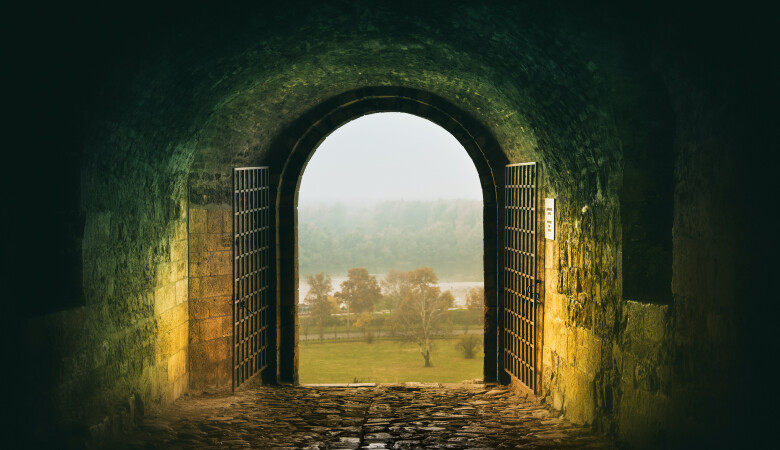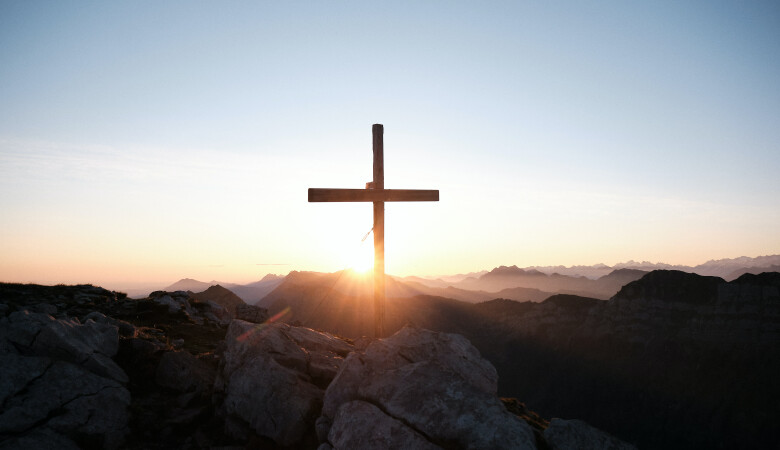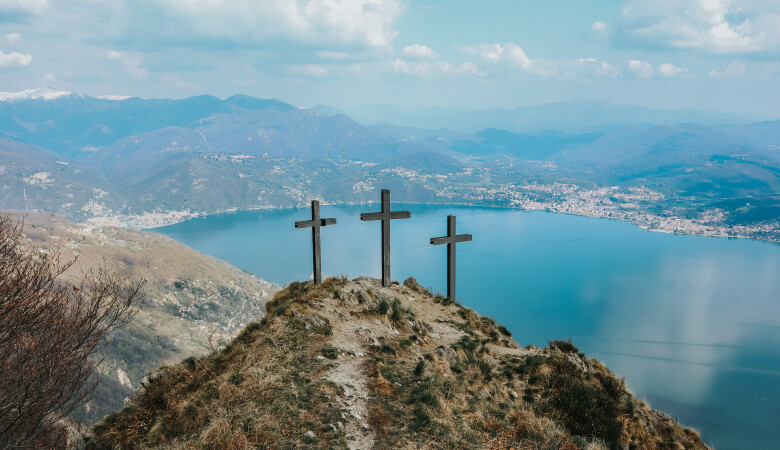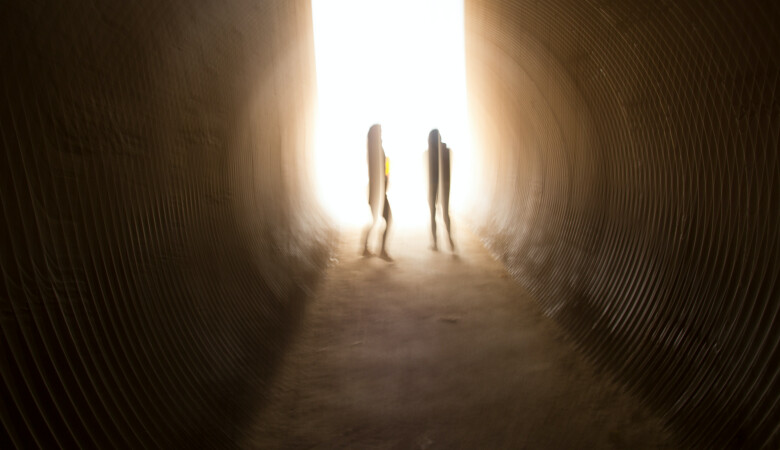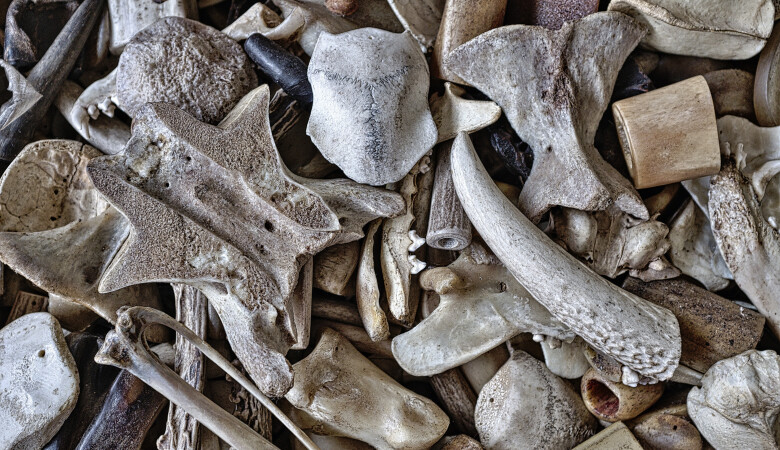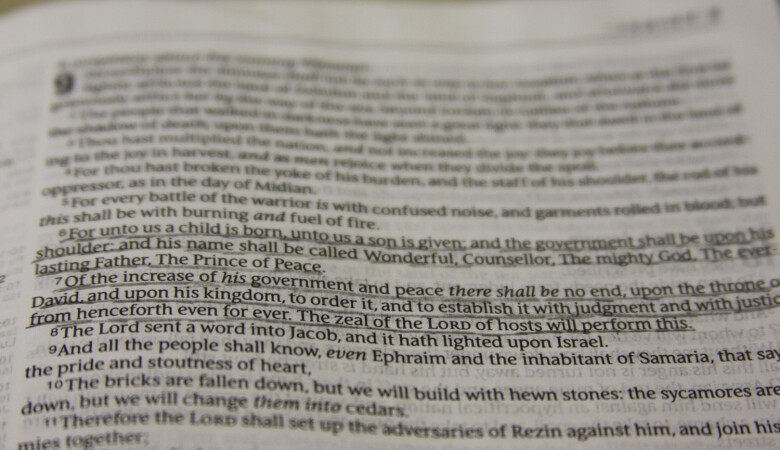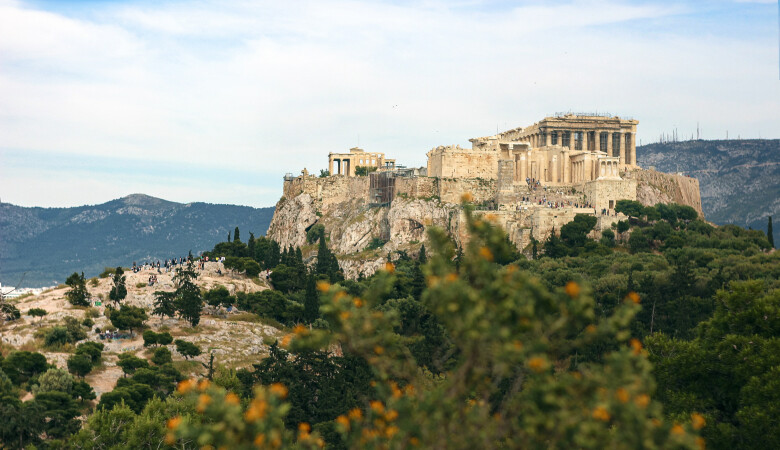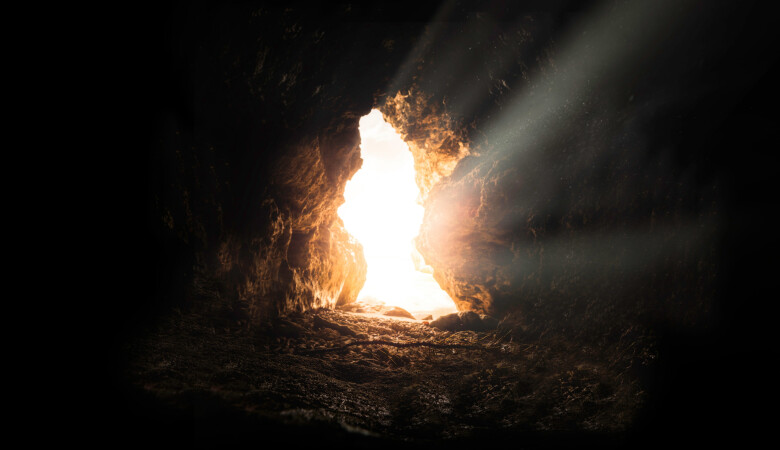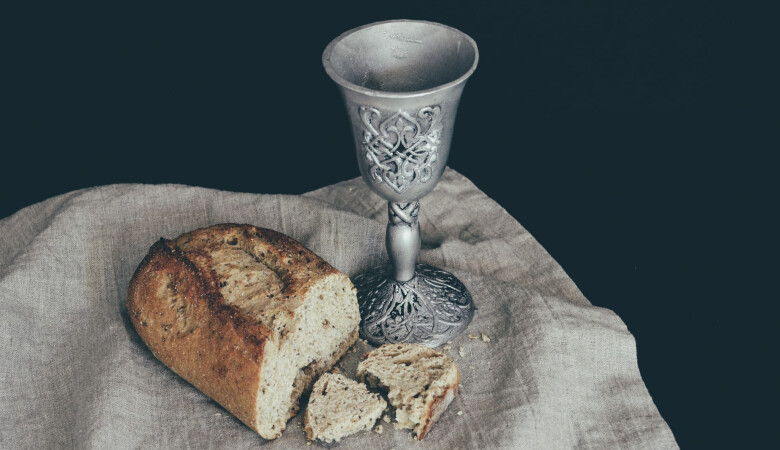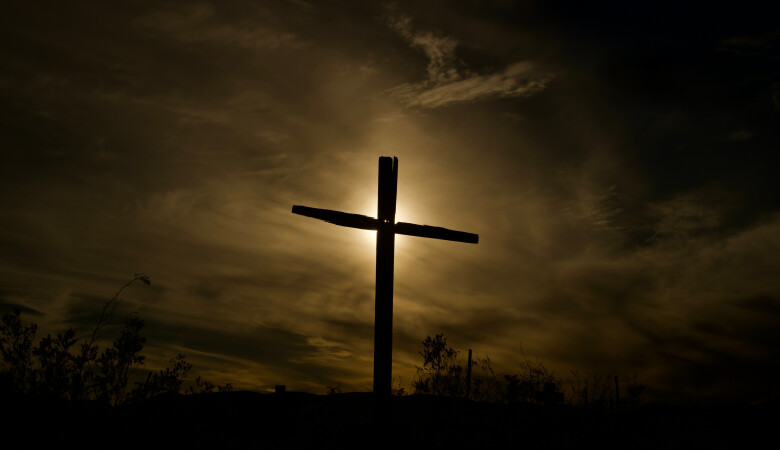Christ is the Resurrection and the Life
April 01, 2018 | Andy Davis
John 11:25-26
Resurrection of Christ
Pastor Andy Davis preaches an expository sermon on John 11:25-26. The main subject of the sermon is that Christ is the resurrection and the life. Our hope is to be found in Him alone.
- SERMON TRANSCRIPT -
Well, I love to preach every time, but I especially love preaching on Resurrection Sunday. Such a gift and a joy for us to gather and celebrate in a special way the resurrection victory of Christ from the grave. And I like to think about missions all the time, I like to think about this resurrection victory, this message, where it was prophesied in Isaiah, that the distant islands and coastlands that have not heard of God's fame or seen his glory, will hear of his fame and see his glory. And to know that that's been going on now for 20 centuries. And so that all over the world, our brothers and sisters are assembling today to celebrate Christ's resurrection victory. That just brings me so much joy.
In 1839 two courageous missionaries from London made a bold attempt to evangelize the natives of the New Hebrides Islands in the South Pacific. Shockingly these two missionaries, these men, were attacked, murdered, and cannibalized, immediately, in full view of the ship that had brought them there — immediately. Nineteen years later, a Scottish minister of the Gospel named John Paton decided to go to those same islands with his wife to seek to bring those same inhabitants, those violent and terrifying cannibals, to bring them to salvation through faith in Christ.
Now, this man, John Paton, had a very flourishing urban ministry there in Scotland, and God was using him greatly, but he felt a strong and overpowering call to missions. But there was an elder in his church, a man named Mr. Dixon, who was very upset when he heard what John Paton was planning to do with his wife. And he went to him and rebuked him vigorously saying, "You will be eaten by cannibals." And to this, John Paton replied — this is one of the great replies in church history, listen to this — "Mr. Dixon, you are advanced in years now, and I believe your own prospect is soon to be laid in the grave and there to be eaten by worms. And I confess to you that if I can but live and die serving and honoring the Lord Jesus, it will make no difference to me whether my mortal body is consumed by cannibals or by worms. And in the great day, my resurrection body will rise as fair as yours in the likeness of our risen Redeemer." Now, that's a great answer. I'm sure all of you are wondering “Who writes his stuff? That's really good!” What an answer, what faith, what courage and what clear perspective based on the good news that assembled us here today, Jesus’ triumph over the grave, his resurrection victory.
And I wanna begin this Easter sermon by asking you two questions or sets of questions. First, do you realize, personally, that it is appointed to you to die once, and after that, to face judgment? Are you aware that you are going to die? Secondly, do you believe that through faith in Christ, your body will rise glorious from the grave on the final day? Those are two questions I wanna pose to you. What I mean is this, if the Lord doesn't choose to return in our lifetime, if we're not the final generation, every single one of us will die. Our hearts will stop beating, our lungs will stop filling with air, our brain waves will cease. I don't know how. I don't know when. But it will happen to each one of us. It could be suddenly like a car accident or drowning. It could be expected after a long illness. It could come when we are relatively young, or it could come when we are very old, but it will come if the Lord doesn't return first. And then your body will decompose and most likely be eaten by worms. Do you ever think about this? Does it cross your mind, or do you try to remove the thought of death as far from you as possible?
I have performed many funerals, and I've done many graveside services, and I've noticed the habit of the funeral homes is to cover the dirt with AstroTurf, and the hole in the ground also is covered, and you can't see it. And there are nice cloths and drapes, and there's all kinds of coverings. But the Book of Ecclesiastes said, “I would rather go to the house of mourning than the house of feasting.” It is good for us to realize where we're going. It's good for us to look at the dirt and the hole in the ground. I'm not advocating that funeral directors change their patterns, not at all. I'm just saying you need to know, you need to be mindful of where you're going. And as you face the inevitability of your own death, have you found comfort in the unshakable truth that Christ came to give you a resurrection body as glorious as his?
Easter Sunday is a time for a joyful celebration for us and for Christians all around the world, celebrating Christ's triumph over the grave. We Christians believe in the bodily resurrection of Jesus Christ from the grave. We believe that the tomb was empty on the third day; that the grave clothes were still there — Jesus had mysteriously risen up out of the grave clothes and left them there as a physical evidence of his resurrection power; that he was already out of the tomb by the time the stone was moved by the angel. He was already gone, passed right through the walls. And then he gave to many eyewitnesses many convincing proofs that he was alive. We believe in that.
"Easter Sunday is a time for a joyful celebration for us and for Christians all around the world, celebrating Christ's triumph over the grave. We Christians believe in the bodily resurrection of Jesus Christ from the grave. "
And as a matter of fact, we believe if that hasn't happened, as the Apostle Paul says in 1 Corinthians 15, our faith is futile, and we're still in our sins. We absolutely are banking on the fact that that's true, that it's historically accurate. And we're gonna feel the marvelous weight this morning, I trust through the Spirit, of Jesus' statement in verses 25 and 26, Look at it again, if you would. “Jesus said to her, ‘I am the resurrection and the life. He who believes in me will live, even though he dies; and whoever lives and believes in me will never die.’” So I wanna walk through this account today. I just wanna go through the narrative, and I wanna draw from it spiritual principles that will help us. More than anything, I want to get you to see Christ, his nature, his character, his power, and so I'm just gonna focus on what he was doing as we walk through this narrative.
I. The Surprising Purpose of Jesus
I wanna begin in verses 1-16 with the surprising purpose of Jesus. The basic framework of this story is Jesus' friendship with a specific family, with Lazarus and his two sisters, Martha and Mary. He already knew them. This is the context of the matrix of this marvelous miracle, and it's clear that he raised Lazarus from the dead because he loved them. It was an extension of his love relationship with them, but the account begins with a very surprising purpose of Jesus. It says that he actually lingered where he was extra days. And he did that, lingering, the adding of the two extra days, because he loved them. He did this on purpose because he loved Lazarus and Martha and Mary. Look at verses 1-4. “Now a man named Lazarus was sick. He was from Bethany, the village of Mary and her sister Martha. This Mary, whose brother Lazarus now lay sick, was the same one who poured perfume on the Lord and wiped his feet with her hair. So the sisters sent word to Jesus, ‘Lord, the one you love is sick.’ When he heard this, Jesus said, ‘This sickness will not end in death. No, it is for God's glory so that God’s Son may be glorified through it.’” So now, by this time in John's Gospel, by this time in Jesus' public ministry, he's done a river of miraculous signs in Palestine. His reputation as a healer of every disease and sickness conceivable to man was well established. There was no sickness he could not heal. There was no case that was too difficult for him.
Also, by this time, Jesus had met this family that lived in Bethany just two miles from Jerusalem. He knew them personally. The sisters, Martha and Mary, were obviously very familiar with Jesus, and you see it right in the account, “Lord, the one you love is sick.” You have a strong connection with Lazarus. Jesus proclaims that Lazarus’ sickness will not end in death. That's not the final end of this sickness. Now, obviously, such a statement could be easily misunderstood, but it really is the key to everything. It's the key to our gaining hope from this text today — the understanding of what the word “end” means. Though we will go through death, we will not end in death. Isn't that incredible? Our sickness as Christians will not end in death, none of our sicknesses, even if they're terminal, but rather, Lazarus’ sickness, like all the sufferings of God's children are for God's glory, that God's Son may be glorified through them.
Now, look at verses 5 and 6, “Jesus loved Martha and her sister and Lazarus. So [Verse 6] when he heard that Lazarus was sick, he stayed where he was two more days.” There was a strong link between verses 5 and 6. Jesus stayed the extra days because of his love for them and for us, because at the end of this whole encounter, their faith in Jesus' power will be vastly greater than it was before, and so will ours as we read this account.
So we need to just take an application. Just stop right now and do some application of this for ourselves. God will orchestrate trials and afflictions for us, and they will be incredibly painful, and he does it to strengthen our faith and put his own glory on display, and they will go on longer than we want them to go on. And we will begin to question and wonder about his timing. And you'll be tempted to question his love as I think Martha and Mary do in this account. But you need to understand that God only means good for you in Christ.
Well, Jesus has to draw his disciples into his plan. He wants them to understand ahead of time what he's going to do. Jesus' ways are often difficult to follow, and so he has to explain his plan to his disciples. Look at Verse 7-10, “Then he said to his disciples, ‘Let us go back to Judea.’ ‘But Rabbi,’ they said, ‘a short while ago the Jews tried to stone you, and yet you are going back there?’ Jesus answered, ‘Are there not twelve hours of daylight? A man who walks by day will not stumble, for he sees by this world’s light. It is when he walks by night that he stumbles, for he has no light.’” So we need to establish clearly the boldness, the courage of Jesus. It's not like he didn't know that he had mortal enemies in Jerusalem, very powerful enemies that were conspiring to kill him, and that it reached really a critical level the last time he was there. He knew that. But he also understood that his father had measured everything carefully out in his life. All of the days ordained for Jesus were written in God's book before one of them came to be. And so he knew that there was a certain allotted amount of time, 12 hours of daylight, and he says the one who “walks by day will not stumble, for he sees by this world’s light. It is when he walks by night that he stumbles, for he has no light.”
What that means is you need to see your life... I just wanna stop again and just apply this. You need to think about your life span, the way Christ thought about his. Your days are measured out. They're not limitless. Your time here on earth is measured out. There's a certain finite number of days, and if you have your eyes open spiritually, if you can see by faith the span of your life, you will walk as Jesus did, seeking to glorify God by doing the works he has prepared for you to do. But if you don't, you're in darkness. You don't understand the purpose of life. You don't understand the meaning of life.
Now, in verses 11-16, we have Jesus' remarkable attitude toward death. “After he had said this, he went on to tell them, ‘Our friend Lazarus has fallen asleep; but I am going there to wake him up.’ His disciples replied, 'Lord, if he sleeps, he will get better.’ Jesus had been speaking of his death, but his disciples thought he meant natural sleep. So then he told them plainly, ‘Lazarus is dead, and for your sake I am glad I was not there, so that you may believe. But let us go to him.’ Then Thomas (called Didymus) said to the rest of the disciples, ‘Let us also go, that we may die with him.’” Now, Jesus' way of speaking of death here is stunning. He just calls it sleep. He did this also with Jairus' daughter: "The girl is not dead, only sleeping." To Jesus, given his irresistible power over death, raising a dead person is no more difficult for him than rousing a sleeping person.
But his disciples did not understand this figure of speech, so Jesus must tell them plainly, Lazarus is dead. Now, just if we could stop and say, where did he get his information? There was no other messenger coming from Martha and Mary at this point. Jesus knows everything, and so he knew exactly when Lazarus had died. But he wants them to understand what exactly is going on because he knows that for us, there's a vast difference between sleep and death. When we come up upon a loved one who's lying in bed, and his eyes are closed, we feel confident that all we need to do is shake him a little, shake him on the shoulder, touch his forehead or his hand, speak gently to him, and he'll open his eyes.
But what if when we enter the room, we just have a different feeling. Something comes over us, and then we look down, and we touch him, and he feels cold to the touch, very cold, and our hand jerks back, almost like we've touched something hot, but it's not, it's cold. And we notice that his chest isn't rising and falling. And then, all of a sudden, some things start happening in our bodies, where our breathing starts getting short, and the adrenalin starts moving, and we wonder — right away we know what we're dealing with — this person might be dead. We don't say that. But then you shake the person, and there's no response. And I don't know at what point you realize, maybe you try to open their eyes, but you know this person is not only sleeping, this person is dead. Maybe you scream, cry out in agony, 'cause you know there's a vast difference between sleep and death. This loved one, this one that you love, will never rise out of that bed again. You'll never see him again in the land of the living. You're not going to be able to have a conversation. All of the sweet fellowship that you've enjoyed with this person in this world is over. You know the difference. And so Jesus has to tell them plainly, Lazarus is dead.
And then he says something very shocking, "And for your sake I am glad." Glad? Glad. How can you understand the emotional life of our Lord? Later in this account, he's gonna show very different emotions than gladness, very different. But here, he says, "For your sake, I am glad I was not there, so that you may believe.” It's not like they didn't believe before, but their faith needed to grow, it needed to develop. So does mine. So does yours. And so, for your sake, I'm glad I can do this with Lazarus. I want to expand your sense of my greatness, and for that, for the joy that's set before all of us, I'm glad to go through this misery and pain. That's the nature of his gladness — to put himself on display. He wants to put himself on display. That's the nature of his gladness. But the gladness also is a foretaste of the days when death will be no more. In the New Jerusalem, in the new heaven and the new earth, where he will wipe every tear from our eyes, and there'll be no more death or mourning or crying or pain, for the old order of things will have passed away. And so it was a gladness in foretaste. Now, however, for Jesus, it's time to work. There's some work to be done. The 12 hours of daylight haven't ended yet. And so he says in Verse 15, “Let us go to him.”
II. The Stunning Promise of Jesus
Now, in Verses 17-27, we see the stunning promise of Jesus. And when he arrives at Bethany, he walks into a cold sea of sorrow, 17-19: “On his arrival, Jesus found that Lazarus had already been in the tomb for four days. Bethany was less than two miles from Jerusalem, and many Jews had come to Martha and Mary to comfort them in the loss of their brother.” So Lazarus has been dead four days. Now, I think if you do the calculation, it might have taken one day for the messenger from Martha and Mary to get to Jesus, then there is that fateful two-day delay, and then there's one day for Jesus to get back to Bethany. So when did Lazarus die? Figure it out. Probably a few hours after the messenger left. Jesus didn't wait two days for Lazarus to die. He was already dead. So why the two-day delay? Because the Jews back then had a sense that the soul hovered around the grave for three days, but on the fourth day it's done, he's dead. Now, that's not in the Bible, but many contemporary accounts give us that sense. And we know that as soon as someone seems to be dead, you don't give up on them. You might do CPR. Maybe you've dragged somebody out of the swimming pool, and there's a chance to revive them. Mouth-to-mouth, something like that. But four days? There's no emergency team on earth that would make any efforts that somebody that's been apparently dead for four days, no breathing, no brain activity, four days, they are no doubt about it, dead. And Martha says in Verse 39, "By this time decay will have set in." But the key we need to understand, it's no more difficult for Jesus to raise someone who's been dead for four minutes or four hours, or four days, four weeks, four months, four years, four centuries. It’s all the same to him. Lazarus is asleep. Jesus' power is limitless.
Nothing's impossible for him, but like he says about his own prayer, "I'm saying this for your benefit, I'm doing the four days for you, because you know he's dead, it's been settled in your mind." Furthermore, the four days allow for a vast audience coming from Jerusalem. A vast assembly of mourners have come. And this is going to be Jesus' second greatest miracle, second only to his own resurrection that we celebrate today. And so there's gonna be a huge audience. This miracle is not done in a corner. And so Jesus steps into this sea of mourners and all of this grief and sadness. And they did mourning far more than we do. We really shrink it; they would expand it. They would be there for a long time grieving with the family. And so he just walks into that ocean of grief, but the coldest waters came from Martha and Mary.
Martha hears that Jesus has come and she gets up immediately. Look at verses 20-22: “When Martha heard that Jesus was coming, she went out to meet him, but Mary stayed at home. ‘Lord,’ Martha said to Jesus, ‘if you had been here, my brother would not have died. But I know that even now God will give you whatever you ask.’” So Martha is a woman of action, she's very practical. Mary, more the contemplative, she stays inside. I think it's significant. It seems that she's too wrapped up in her grief to deal with Jesus at this point, to face him.
I think they're both wrestling with the same question deep inside, with the same wound. Not only have they lost their brother, but they don't understand Jesus. They don't understand why he didn't come. “Lord… if you had been here, my brother would not have died.” It is a statement of faith, a confession of faith. But also I think we could see another question in there, another question. A sense of disappointment. Why didn't you come? Don't you love us? Don't you love me? Don't you care that we're swimming in sorrow right now? This is the mystery of providence that we all have to deal with. Providence is going to hurt you at some point. It’s going to hurt and you're gonna look vertically and you're gonna wonder why God is doing this to you, and you need to realize God is perfectly good, and he only means good for his children.
Everything he does for us is good. Remember Jeremiah 29:11, “‘I know the plans I have for you,’ declares the LORD, ‘plans to prosper you and not to harm you, plans to give you hope and a future.’” Both Martha and Mary still believe that Jesus is Lord. They still believe he could have healed Lazarus. Verse 22, “I know that even now, God will give you whatever you ask.” Don’t think she means, “Even now, you'll be able to raise Lazarus from the grave.” I don't think that was in her mind. “Even now, God will let you continue to do your healing ministry,” perhaps. However, they are both, I can assure you, vastly underestimating Jesus. They're underestimating his power, they're underestimating his wisdom, they're underestimating his love for them.
And only by seeing what he only can do, well, they more fully understand who he is and how great is his power over sin, suffering and death. So he makes to Martha his first promise in this account. Verse 23, “Jesus said to her, ‘Your brother will rise again.’” Jesus is promising that she is going to see Lazarus alive again. Now, just stop and let me apply that. In Christ, all of your loved ones who are in Christ and you're in Christ, if they die, you will see them again. And that's why we Christians grieve, not as those who have no hope. We're gonna see him again. "Your brother will rise again.” But he's gonna teach her far more than that, far more than that the sickness will not end in death and all that. He has something more to teach us.
Now, Martha makes a remarkable faith-filled confession. This really, I think, in some degree — well, 24 and 27 — is Martha's shining moment in the Bible, and she's really quite remarkable. “Martha answered, ‘I know he will rise again in the resurrection at the last day.’” Now, she's learned her Bible lessons well. The resurrection is taught in the Jewish scriptures, many. Isaiah 26:19, for example, “But your dead will live; their bodies will rise. You who dwell in the dust, wake up and shout for joy. Your dew is like the dew of the morning; the earth will give birth to her dead.” Couldn't be plainer. That's in Isaiah 26, verse 19, but even better, Jesus taught it openly.
John Chapter 6:38-40, “For I have come down from heaven not to do my own will but to do the will of him who sent me. And this is the will of him who sent me, that I shall lose none of all that he has given me, but raise them up at the last day. For my Father's will is that everyone who looks to the Son and believes in him shall have eternal life, and I will raise him up at the last day.” So Martha is saying that back: "I know that he will rise in the resurrection at the last day." But do you get a sense that that doctrinal knowledge is distant from her at that moment? It's like something rolled up in the attic of her doctrinal mind. It’s not doing her much good. Or like some slogan or some Bible verse that's cross-stitched and hanging on the wall, but it's really not bringing her much comfort at all. And we do that with Christian theology, we do that with doctrine. It’s like not bringing us any sense of healing or joy right now.
"I know he'll rise in the resurrection at the last day." Stop! That is glorious good news. But it's not meaning anything. And worse, I think she has that seed of doubt about Jesus, about his wisdom, about his power and his love, so the two are like separate topics in her mind. There is the resurrection of all the dead at the last day, and then there's you Jesus. No, no, no, we're gonna put them absolutely together. They're going to be harmonized. They're gonna be perfectly united. Verse 25, Jesus makes this incredible assertion: “I am the resurrection and the life.” What an incredible assertion. This kind of assertion can only be made by Almighty God. It's just like the other "I am" statements.
Jesus makes seven "I am" statements in John's Gospel, like saying, "I am the bread from Heaven, come down from heaven to give life to the world." I mean, who could say that but God? "I am the light of the world. I am the door for the sheep. I am the Good Shepherd." And later, "I am the way to heaven, and I am the truth, and I am the life, and no one comes to the Father except through me." So Jesus does not merely teach the resurrection of the dead in an orthodox fashion. He does not actually even merely bring about the resurrection of the dead. He is the resurrection. And not only is he the resurrection, he is the life that will follow that resurrection. He's everything.
"He is the resurrection. And not only is he the resurrection, he is the life that will follow that resurrection. He's everything."
So there's total identity of Jesus with the resurrection. That’s essential, though we will never fully understand it in this world, or even in the next. I think it's a beginning, when he says, "I am the resurrection," to say this: "Apart from me, there is no resurrection." That's a start. There is no resurrection from the dead apart from Jesus. There’s no other options to death. But that's only the beginning of, "I am the resurrection." Think of it this way, "I am the essence, the distilled perfection of resurrection. I am what resurrection is. And keep going... I am the opposite of death, death is the opposite of everything that I am as darkness is the opposite of light. Life flows through me. Every living thing on earth has its existence through me."
It says in the prologue in this Gospel, [John 1:3-4] “Through him [Jesus] all things were made; without him nothing was made that has been made. In him was life…” So all of the leaves with their photosynthesis, they're doing that mysteriously in Jesus. And all of the beasts that have the breath of life in their nostrils, they breathe through Jesus. He is life. But even more than that, he is human life, and he is eternal life. He is life. And what that means, conversely, is he hates death. Death is his mortal enemy. It’s the opposite of everything he is. And so that's the assertion, "I am the resurrection and the life,"
Then he makes her a precious promise and he makes it to us too. Look at it: “I am the resurrection and the life. [Verses 25-26] He who believes in me will live, even though he dies; and whoever lives and believes in me will never die.” So what that means is if you can make Martha's confession in verse 27, “I believe that you are the Christ, the Son of God…” If you believe that he is the Christ, the Son of God, if you believe that he died on the cross for your sins by simple faith, trusting that Jesus died in your place under the wrath of God — if you believe that, and if you believe that God raised him from the dead on the third day, you will live forever in resurrection glory even if you die physically. That's the celebration of Easter.
It's not merely that this great hero 2,000 years ago did some great thing, and we're here today to honor him and to remember him. No, you get a portion of the plunder from his victory. He’s bringing it to you. Just like the feeding the 5,000, you get to eat and chew and swallow; you get to draw this life into yourself and the benefit comes to you. Jesus said in John 14:19, “Because I live, you also will live.” And that eternally, in a resurrection body.
Beyond that, Jesus says if you believe in him, you'll never die. Now, what does that mean? Because Lazarus died and he believed in Jesus, and we know many that fall asleep in Christ — they die. So what does he mean, “Whoever lives and believes in me will never die.” Well, the only way really to understand this is to understand death doesn't end at physical death, there's another death beyond it. It's called in the Bible the second death.
It says in Revelation 20:14, “The lake of fire is the second death.” There is a death beyond physical death. And Jesus is saying that, "If you live and believe in me, you will never experience the real death.” And that real death is not mere sleeping, but that's an eternity where the worm does not die and the fire is not quenched, where the damned will hear before they're thrown in the lake of fire, “Depart from me, you who are cursed, into the eternal fire prepared for the devil and his angels.” [Matthew 25:41] That is the death I think Jesus is referring to. If you live and believe in him, you will not experience that death.
So Jesus has made an assertion: “I am the resurrection and the life.” He has made a cluster of two beautiful promises: “He who believes in me will live, even though he dies; and whoever lives and believes in me will never die.” Now, he asked this probing question: “Do you believe this?” He says this to Martha, "Do you believe in me?" Now, I'm going to ask this question at the end of the sermon in a few moments, again, but Martha without hesitation — look at Verse 27 — answers and declares her faith: “‘Yes, Lord,’ she told him, ‘I believe that you are the Christ, the Son of God, who was to come into the world.”
Friends, this is the center piece of the Easter celebration, the Easter hope — facing the historical reality of Jesus' death on the cross in our place for our sins and his bodily resurrection from the grave on the third day and finding your salvation in that. But now we need to drive away any lingering doubts we may have about Jesus Christ with the rest of the account. We need to learn to embrace his love and compassion for us, who still have to walk through the land of the valley of the shadow of death.
III. The Secret Passion of Jesus
So look at the secret passion of Jesus, verses 28-38. Death is the final enemy, and Jesus knows this. He knows that that day will not end death. He knows that his loved ones, his beloved people, are going to have to suffer in almost incalculable ways for 20 plus centuries because of death. He knows that better than we do. And this fact draws from the infinitely deep recesses of Jesus' soul, from his heart, a river of feeling of compassion, of emotion that's hard to even understand or calculate. And I think the best comfort that God can give us who have to walk through the valley of the shadow of death is the fact that he will walk with us and cares how we feel as we're going through it — his compassion.
He says in Isaiah 43, “Fear not, for I have redeemed you; I have summoned you by name; you are mine. When you pass through the waters, I will be with you; and when you pass through the rivers, they will not sweep over you. When you walk through the fire, you will not be burned; the flames will not set you ablaze.” “I'm gonna walk through it with you.” And we have it on display right here in John 11. No better chapter, actually, in the whole Bible, to see the compassion of God through the misery and the sorrow of death. We are all gonna die if we're not that final generation. And before we do, most likely, we're gonna lose loved ones in death, and we're gonna have to attend some very painful funerals, some vastly more painful than others.
I can hardly imagine a more heart-rending funeral to attend then the funeral of your own child, especially a young child. I mean, if I kept talking, I would easily start crying here, it'd be easy to do. Because honestly, death is merciless, the merciless enemy, and it stalks by day and by night, and we have no answer, not within ourselves. And it's not gonna spare anyone. Young or old, not safe. Rich or poor is not safe. Healthy or sickly is not safe. Powerful or weak, not safe. Famous or obscure, doesn't matter, not safe.
And death will rip apart so many of the best laid plans of those individuals and families, rip them right apart, leave them dead on the ground. And mourners are gonna stand over that freshly dug grave and they're gonna feel an anguish in their hearts that they can't put into words. The best ministry I can give as a friend in that situation is to point them to John 11, Jesus' compassion, the fact that he cares what you're thinking, and the fact that some day he's gonna kill death forever. And so we see the emotional life of our Lord. And up to this point, all we've seen is Jesus' kingly side, his regal side, his powerful side. He's absolutely in charge. He’s in control. He knows what's happened with Lazarus. He’s a king.
But it's the tender Mary who just causes the rivers to flow from within. Mary, the one who sat at his feet, drank in his wisdom, the one who chose the better portion — remember, it wouldn't be taken from her — that Mary, the one who anointed him. But this time I think she's so devastated by Lazarus' death and Jesus' inexplicable delay that when Martha went out to see Jesus, she couldn't come yet. Wasn't ready. So Jesus has to specifically call her by name. He knows his sheep, and he calls them by name. “The teacher is asking for you,” and she gets up and comes. And when she gets there, verse 32, “she fell at his feet and said, ‘Lord, if you had been here, my brother would not have died.’” Same thing Martha said. “When Jesus saw her weeping, and the Jews who had come along with her also weeping, he was deeply moved in spirit and troubled.” Mary's anguished statement just opened up the Lord's heart and his emotions begin to flow — I wanna say freely, but also deeply. Some of it's absolutely hidden, and we wouldn't know about it except that John, under the inspiration of the Holy Spirit, told us what he was really feeling.
Look what it says, Jesus, in verse 33 “was deeply moved in spirit.” The Greek phrase used there is one of rage. Rage! But it's got a prefix that implies it's totally inward, like an inward-focused rage. So there's this absolute rage within him, like a subterranean river that's not visible, and John puts also the words after that, "He's raging within himself in his spirit." So we get it, it's not clearly displayed. If you've been standing there, you wouldn't see it fully. You'd see something. And then he adds another verb, “and troubled.” And so that's like a stormy sea, it’s like the churning tossing sea. That’s Jesus at that moment, rage and billowing, foaming, churning sea. But it's within himself.
What is he so angry about? If you've been there standing near him, you would have seen some emotions, maybe some twitches on his face or something in his body, but you would have seen less than the tip of the iceberg. This rage of Jesus is not directed at any person, not at all. He’s not angry at Mary, he's not angry at Martha, he's not angry at all the Jews that have assembled to mourn with them.
What then? Well, go back to what Jesus said a moment ago, "I am the resurrection and I am life." So how is he toward death? He hates it with a hatred we can't even measure. Death is really, to some degree, his personal enemy. But God in his wisdom has ordained that after Christ's resurrection from the dead, and after his ascension to heaven, and after he passes through the heavenly realms, he would sit at God's right hand until all of his enemies would be made a foot stool for his feet. And the last enemy to be conquered will be death.
In the meantime, we have 20 centuries of funerals. It's like he would like to rip death apart right there and then, but he can't do it. He’s held back by the father's wise and sovereign plan. And he knows he's not gonna show up at each one of those funerals and raise the individual up. And by the way, if you got your wish and that happened, would the individual be happy to come back? Would they wanna leave heaven and come back and be with you and alleviate your earthly misery? They won't come to us, we're gonna go to them. Amen, hallelujah. God is wise, but he also cares about our feelings.
And God the Father has willed that the wages of sin is death. He willed that back from the beginning, in the garden of Eden, that if you eat from that tree, you will die. And through the sin of one man, Adam, death entered the world. This is the just penalty of God for our sins, but how deeply Jesus yearns to end death's vicious reign right then. But what you do see is you see tears. Look at Verse 34, ‘“Where have you laid him?’ he asked. ‘Come and see, Lord,’ they replied. Jesus wept.” Shortest Verse in the Bible, the most stunning. There he is, and these tears are coming down.
And yet there's more questions about Jesus. Verse 36, “…the Jews said, ‘See how he loved him!’ But some of them said, "Could not he who opened the eyes of the blind man have kept this man from dying?’” So weeping showed that he loved them, but why didn't he come? Why didn't he heal? He did that blind man, that was incredible. He could have done this, just probably has a fever or something. Why couldn't he heal him? And so there's still questions.
IV. The Supernatural Power of Jesus
And honestly, the promise that he made in Verse 25-26 don't mean anything if he doesn't have the power to do it. And so he wants to put that power on display. So we see the supernatural power of Jesus, verse 38-44. Jesus is again deeply moved in spirit, same word, that rage is inside, he comes to the tomb. It’s like, "Here I am, and I'm facing my enemy.” And it's a cave with a stone laid across the entrance, the very same setup that he will display his own resurrection victory over in a very short time.
And he gives the command, ‘“Take away the stone,’ he said. ‘But Lord,’ said Martha, the sister of the dead man, ‘by this time there is a bad odor, for he has been there four days.’ Now, this is Martha, this is us. You're up, you're down. Great moment in verse 27, not so great here. But isn't that real? You go through wrenching sorrow and you'll have your high times and your low times, just like you're a little rowboat on a stormy sea. And so she's at a low point here, worried about the odor. But she doesn't really realize who Jesus is and what he's about to do and no bad odor is gonna stop what he's about to do. And so he prays, at that point, a simple, powerful prayer. They move the stone, and then Jesus looks up to the father and says, “Father, I thank you that you have heard me. I knew that you always hear me, but I said this for the benefit of the people standing here, that they may believe that you sent me.” Jesus said earlier in John 5:19, "I can do nothing apart from the father.” Apart from the Father, the Son does nothing. He only does what he sees the Father doing. He wants them to know that it's the Father who's gonna be raising Lazarus, and he does it by this simple prayer.
And do you see the child like confidence of Jesus in his prayer? It’s not an ornate or elaborate prayer, just "Father, I thank you that you heard me. I know that you always hear me. But I'm praying it for all these people standing around listening to me.” And I feel like I'm part of them. I’m just standing there and I'm listening to Jesus pray and just a simple confidence as he looks up to the Father. And then he cries out, “Lazarus, come forth!” with a loud voice. The power of Jesus. And with the words comes a corresponding supernatural power that only Christ possesses. With the words comes the power to obey, and he rises up in the tomb and comes alive.
V. The Searching Question of Jesus
Now, we have standing in front of us, as I told you a few minutes ago, the searching question of Jesus. “Jesus said to her, ‘I am the resurrection and the life. He who believes in me will live even though he dies, and whoever lives and believes in me will never die.’” An assertion, “I am the resurrection and the life,” a double promise, and then a searching question. So I'm asking you now, on behalf of God, on behalf of Christ, do you believe this? Do you believe this? I believe there are probably many guests here that don't usually go to church. I just wanna stand and ask, do you believe that Jesus died for your sins?
All you have to do, it says in Romans 10: “If you confess with your mouth, ‘Jesus is Lord,’ and if you believe in your heart that God raised him from the dead, you will be saved.” That's all you have to do. You don't have to do any good works, you don't have to walk forward or backward or sideways in the sanctuary, you don't have to sign a card. All you have to do is quiet your mind, your heart, look upward in your mind and say to God you have violated his laws, you deserve to die. But because Jesus died in your place, you're not going to die. You trust in Jesus as your Savior. That’s all you have to do, and if you believe that, you will be saved.
If you're already a Christian, you did that years ago. Are you deriving benefit from that promise right now? Tomorrow we're going to go to Lorraine Geer's funeral, and I'm praying, and I know that Tom — what a strong faith this brother has and his whole family, just a beautiful display of faith — and they are not gonna be grieving like those who have no hope. They are going to believe — they do believe — in the resurrection from the dead, including Lorraine and including themselves. And so we have to derive hope from the fact that some day death will be no more, and he's gonna wipe every tear from our eyes and there'll be no more death, mourning, crying, or pain.
Thirdly, we need to be co-laborers with Jesus. Alright? Jesus gives us jobs to do. Alright? Like in the account, “Roll away the stone.” Could Jesus have rolled away the stone? “Oh, stone be rolled away.” Sure, he could do that. But he wanted them to do it. And so before Lazarus is even resurrected from the dead, there's work to be done. There is a spiritual resurrection that needs to happen in lost people. They are dead in their transgressions and sins. We have, as witnesses, a job to do before they're resurrected. Our job is to share the Gospel with them. Our job is to speak the words of the Gospel. They have no power whatsoever apart from the Holy Spirit, but we have a role to play to speak the words of the Gospel. And Jesus then will speak through the Holy Spirit and raise the dead as they hear the Gospel. Our job is to roll away the stone. Our job is to work leading people to Christ, but it's only God that can do it.
And then after they come to life, we have a job to do, remember? Take off the grave clothes and let him go. And to me, that's just the ministry of teaching them to obey everything they have commanded, leave aside the old dead way of life, and get rid of all those wicked garments and filthy patterns and walk in newness of life. We have a job to do to unwrap the recently alive through discipleship. Let's do our job.
Close with me, if you would, in prayer. Father, thank you for the celebration that we've had today of Christ's resurrection from the dead. I thank you so much for the testimony we have of your power to bring joy even in the face of death, and we've seen so many godly men and women that have grieved, filled with hope, knowing that the resurrection is real and powerful. Father, I do pray that You'd help us to do the works you've given us to do, we can't raise the dead spiritually, we can't raise the dead physically, but we can do the task you've assigned to us. Help us to be faithful to share the gospel. And then faithful ones, those have responded and they're walking now in newness of life, to disciple and train them. Thank you for this day of celebration. In Jesus' name. Amen.






